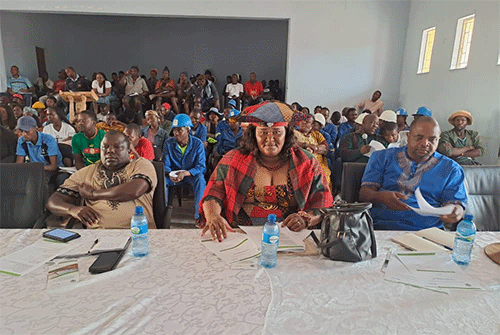OPUWO – Several Kunene residents have expressed their concerns on the green hydrogen scholarships, urging reconsideration of the stipulated criteria, which they believe disadvantage them from a marginalised standpoint.
The region’s inhabitants called on the donors to lower their set standards during the green hydrogen workshop presentation on Friday at Opuwo, which was conducted by the Southern African Science Service Centre for Climate Change and Adaptive Land Management (SASSCAL).
They said the current criteria put them at a disadvantage, as the majority of the youth haven’t attained what is required. The region currently has no higher education institutions, thus affecting them greatly.
Opuwo Urban constituency councillor Ueutjerevi Ngunaihe echoed this sentiment, calling for criteria reductions for the benefit of the least-affluent from traditionally disadvantaged groups.
“Because the region was chosen for this project, I would like to request that these scholarships begin at level one to benefit Kunene’s marginalised communities. It would be ideal if we could lessen the criteria to benefit the communities where the initiative will be launched,” he stated.
Namibia, with its enormous renewable energy resources, was selected as an entrant.
In 2021, Namibia and the German government reached an agreement to provide grant assistance for the development of Namibia’s green hydrogen sector with five million Euro allocated for bursaries for Namibian youth who qualify for various programmes.
Furthermore, Ngunaihe advised those meeting the criteria to apply since this provides life-long potential for the Kunene region’s inhabitants.
The Youth for Green Hydrogen scholarship programme, developed in conjunction with the German government, focuses on four regions, being Kunene, Erongo, Hardap,
//Kharas and Erongo.
The Namibian government has issued a second call for master’s degree and technical, vocational education and training (TVET) applications for Namibian youth.
Namibians between the ages of 18 and 35 are eligible for the scholarship. The master’s degree should emphasise applied sciences, renewable energy systems, logistics, and supply chain management.
Trades such as boiler-making, bricklaying, plastering, plumbing and pipe-fitting, welding and metal fabrication, solar and wind energy system installation and maintenance, and business services, should be covered in the TVET courses.
More than 1 000 youths applied during the first call, and 93 were chosen. – Nampa



